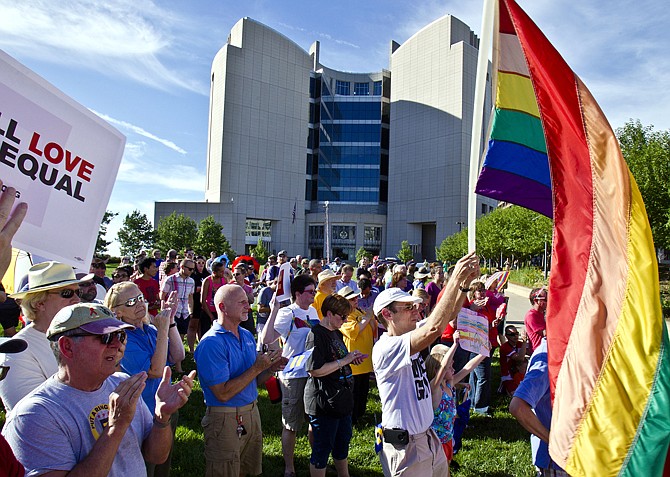Wednesday's ruling by the United States Supreme Court striking down a provision of the federal Defense of Marriage Act is unlikely to affect couples or laws in Missouri, but the full impact of how the decision will be implemented remains unclear.
In a 5-4 decision, the court struck down one particular part of the Defense of Marriage Act, or DOMA, defining marriage as the union of a man and a woman for the purposes of federal benefits. The ruling allows for couples in states where same-sex marriages are recognized to begin receiving the same federal benefits as any other marriage.
But in Missouri, the law is unlikely to have any effect. The state does not recognize same-sex marriages or civil unions, whether within Missouri or those performed in other parts of the country.
The court's decision has no impact on the portion of DOMA that allows states to refuse to recognize same-sex marriages from other states as that question was not before the court.
The court's majority opinion, written by Justice Anthony Kennedy, specifies that the opinion "and its holdings are confined to those lawful marriages" already recognized by certain states. But how the ruling will be implemented at the federal level is still unclear.
"Today's ruling by the Supreme Court is one that will be reviewed regarding its applicability to Missouri laws, but it's really too soon to say what, if any, impact it will have, and how soon any impact will occur," said Scott Holste, press secretary for Gov. Jay Nixon. "When asked about the ruling at a news conference this morning, Gov. Nixon said the ruling reflects the reality that reasonable people are seeing these issues of equality in new ways, and that the decision today was an important step forward for equal protection and due process, two bedrock principles of our democracy."
In a dissenting opinion, Justice Antonin Scalia highlighted the issue now facing states like Missouri, where same-sex marriage is not recognized. Scalia gave the example of a "pair of women who marry in Albany and then move to Alabama," where same-sex marriages are not recognized. He questions whether the couple would be allowed to file a joint federal tax return and which state's law takes precedence: the state where they married or the state where they reside.
Missouri has long defined marriage as being strictly between a man and a woman.
In 1996, the same year DOMA was signed into law by former President Bill Clinton, the Missouri Legislature passed a bill specifying the state would recognize marriage only between a man and a woman, and any marriage not between a man and a woman is invalid. The bill was signed into law by former Gov. Mel Carnahan.
In 2001, the Missouri Legislature further specified that "a marriage between persons of the same sex will not be recognized for any purpose in this state even when valid where contracted." The added provision was signed into law by former Gov. Bob Holden.
In 2004, Missouri voters went a step further in defining marriage within the state. A referendum to amend the state's constitution to define marriage as existing only between a man and a woman was approved with more than 70 percent of the vote.
At the time, then Sen. Sarah Steelman, who sponsored the proposal, said placing the definition in the state constitution would ensure the will of the people would not be invalidated by activist judges.
Several Missouri cities do provide domestic partnership registries, which offer certain benefits to same-sex or opposite-sex couples who live together, including St. Louis, Kansas City, Columbia, Clayton, Olivette and University City. Jackson County also provides a domestic partnership registry.


